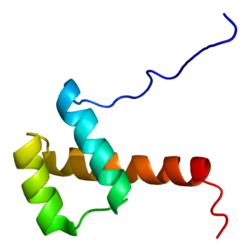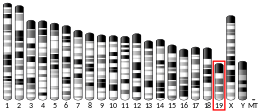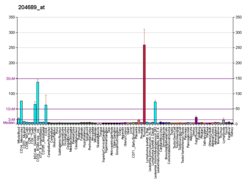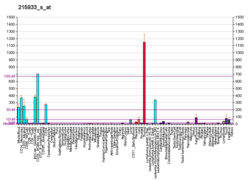HHEX
Hematopoietically-expressed homeobox protein HHEX is a protein that in humans is encoded by the HHEX gene and also known as Proline Rich Homeodomain protein PRH.[5][6][7]
This gene encodes a member of the homeobox family of transcription factors, many of which are involved in developmental processes. Expression in specific hematopoietic lineages suggests that this protein may play a role in hematopoietic differentiation but the expression of this protein is not limited to hematopoietic cells.[7]
Function
The HHEX transcription factor acts as a activator of transcription in some instances and a repressor of transcription others.[8][9] It interacts with a number of other signaling molecules to play an important role in the development of multiple organs, such as the liver, thyroid and forebrain.[10] HHEX serves to repress VEGFA, another protein which is important in endothelial cell development.[11] SCL, a significant transcription factor for blood and endothelial cell differentiation, is shown to interact with HHEX to promote the correct development of the hematopoiesis process.[12] HHEX appears to work together with another molecule, β-catenin, for the development of the anterior organizer.[13] It also contributes to developmental remodeling and stabilization of endothelial cells in an unborn organism.[11] The importance of this transcription factor is illustrated by the inability of HHEX knockout mice embryos to survive gestation. Without the expression of HHEX, these mice embryos die in utero between Day 13 and Day 16.[11] HHEX knockout mice display a range of abnormalities including forebrain abnormalities in various levels of severity, as well as a number of other defects including heart, vasculature, liver, monocyte, and thyroid abnormalities.[10][11] The HHEX protein is important in a variety of cancers and it can act as an tumour suppressor protein or as an oncoprotein depending on the cancer type.
Interactions
HHEX has been shown to interact with Promyelocytic leukemia protein.[14]
References
- ^ a b c GRCh38: Ensembl release 89: ENSG00000152804 – Ensembl, May 2017
- ^ a b c GRCm38: Ensembl release 89: ENSMUSG00000024986 – Ensembl, May 2017
- ^ "Human PubMed Reference:". National Center for Biotechnology Information, U.S. National Library of Medicine.
- ^ "Mouse PubMed Reference:". National Center for Biotechnology Information, U.S. National Library of Medicine.
- ^ Bedford FK, Ashworth A, Enver T, Wiedemann LM (Mar 1993). "HEX: a novel homeobox gene expressed during haematopoiesis and conserved between mouse and human". Nucleic Acids Research. 21 (5): 1245–9. doi:10.1093/nar/21.5.1245. PMC 309289. PMID 8096636.
- ^ Hromas R, Radich J, Collins S (Sep 1993). "PCR cloning of an orphan homeobox gene (PRH) preferentially expressed in myeloid and liver cells". Biochemical and Biophysical Research Communications. 195 (2): 976–83. doi:10.1006/bbrc.1993.2140. PMID 8103988.
- ^ a b "Entrez Gene: HHEX hematopoietically expressed homeobox".
- ^ Denson LA, Karpen SJ, Bogue CW, Jacobs HC (Aug 2000). "Divergent homeobox gene hex regulates promoter of the Na(+)-dependent bile acid cotransporter". American Journal of Physiology. Gastrointestinal and Liver Physiology. 279 (2): G347-55. doi:10.1152/ajpgi.2000.279.2.G347. PMID 10915644.
- ^ Brickman JM, Jones CM, Clements M, Smith JC, Beddington RS (Jun 2000). "Hex is a transcriptional repressor that contributes to anterior identity and suppresses Spemann organiser function". Development. 127 (11): 2303–15. PMID 10804173.
- ^ a b Martinez Barbera JP, Clements M, Thomas P, Rodriguez T, Meloy D, Kioussis D, Beddington RS (Jun 2000). "The homeobox gene Hex is required in definitive endodermal tissues for normal forebrain, liver and thyroid formation". Development. 127 (11): 2433–45. PMID 10804184.
- ^ a b c d Hallaq H, Pinter E, Enciso J, McGrath J, Zeiss C, Brueckner M, Madri J, Jacobs HC, Wilson CM, Vasavada H, Jiang X, Bogue CW (Oct 2004). "A null mutation of Hhex results in abnormal cardiac development, defective vasculogenesis and elevated Vegfa levels". Development. 131 (20): 5197–209. doi:10.1242/dev.01393. PMID 15459110.
- ^ Liao W, Ho CY, Yan YL, Postlethwait J, Stainier DY (Oct 2000). "Hhex and scl function in parallel to regulate early endothelial and blood differentiation in zebrafish". Development. 127 (20): 4303–13. PMID 11003831.
- ^ Zamparini AL, Watts T, Gardner CE, Tomlinson SR, Johnston GI, Brickman JM (Sep 2006). "Hex acts with beta-catenin to regulate anteroposterior patterning via a Groucho-related co-repressor and Nodal". Development. 133 (18): 3709–22. doi:10.1242/dev.02516. PMID 16936074.
- ^ Topcu Z, Mack DL, Hromas RA, Borden KL (Nov 1999). "The promyelocytic leukemia protein PML interacts with the proline-rich homeodomain protein PRH: a RING may link hematopoiesis and growth control". Oncogene. 18 (50): 7091–100. doi:10.1038/sj.onc.1203201. PMID 10597310.
Further reading
- Neidle S, Goodwin GH (May 1994). "A homology-based molecular model of the proline-rich homeodomain protein Prh, from haematopoietic cells". FEBS Letters. 345 (2–3): 93–8. doi:10.1016/0014-5793(94)00446-3. PMID 7911091.
- Crompton MR, Bartlett TJ, MacGregor AD, Manfioletti G, Buratti E, Giancotti V, Goodwin GH (Nov 1992). "Identification of a novel vertebrate homeobox gene expressed in haematopoietic cells". Nucleic Acids Research. 20 (21): 5661–7. doi:10.1093/nar/20.21.5661. PMC 334400. PMID 1360645.
- Manfioletti G, Gattei V, Buratti E, Rustighi A, De Iuliis A, Aldinucci D, Goodwin GH, Pinto A (Mar 1995). "Differential expression of a novel proline-rich homeobox gene (Prh) in human hematolymphopoietic cells". Blood. 85 (5): 1237–45. PMID 7858254.
- Topcu Z, Mack DL, Hromas RA, Borden KL (Nov 1999). "The promyelocytic leukemia protein PML interacts with the proline-rich homeodomain protein PRH: a RING may link hematopoiesis and growth control". Oncogene. 18 (50): 7091–100. doi:10.1038/sj.onc.1203201. PMID 10597310.
- Pellizzari L, D'Elia A, Rustighi A, Manfioletti G, Tell G, Damante G (Jul 2000). "Expression and function of the homeodomain-containing protein Hex in thyroid cells". Nucleic Acids Research. 28 (13): 2503–11. doi:10.1093/nar/28.13.2503. PMC 102703. PMID 10871399.
- Schaefer LK, Wang S, Schaefer TS (Nov 2001). "Functional interaction of Jun and homeodomain proteins". The Journal of Biological Chemistry. 276 (46): 43074–82. doi:10.1074/jbc.M102552200. PMID 11551904.
- Morgutti M, Demori E, Pecile V, Amoroso A, Rustighi A, Manfioletti G (2001). "Genomic organization and chromosome mapping of the human homeobox gene HHEX". Cytogenetics and Cell Genetics. 94 (1–2): 30–2. doi:10.1159/000048778. PMID 11701950.
- D'Elia AV, Tell G, Russo D, Arturi F, Puglisi F, Manfioletti G, Gattei V, Mack DL, Cataldi P, Filetti S, Di Loreto C, Damante G (Mar 2002). "Expression and localization of the homeodomain-containing protein HEX in human thyroid tumors". The Journal of Clinical Endocrinology and Metabolism. 87 (3): 1376–83. doi:10.1210/jc.87.3.1376. PMID 11889211.
- Topisirovic I, Culjkovic B, Cohen N, Perez JM, Skrabanek L, Borden KL (Feb 2003). "The proline-rich homeodomain protein, PRH, is a tissue-specific inhibitor of eIF4E-dependent cyclin D1 mRNA transport and growth". The EMBO Journal. 22 (3): 689–703. doi:10.1093/emboj/cdg069. PMC 140753. PMID 12554669.
- Nakagawa T, Abe M, Yamazaki T, Miyashita H, Niwa H, Kokubun S, Sato Y (Feb 2003). "HEX acts as a negative regulator of angiogenesis by modulating the expression of angiogenesis-related gene in endothelial cells in vitro". Arteriosclerosis, Thrombosis, and Vascular Biology. 23 (2): 231–7. doi:10.1161/01.ATV.0000052670.55321.87. PMID 12588764.
- Puppin C, D'Elia AV, Pellizzari L, Russo D, Arturi F, Presta I, Filetti S, Bogue CW, Denson LA, Damante G (Apr 2003). "Thyroid-specific transcription factors control Hex promoter activity". Nucleic Acids Research. 31 (7): 1845–52. doi:10.1093/nar/gkg295. PMC 152810. PMID 12655000.
- Bess KL, Swingler TE, Rivett AJ, Gaston K, Jayaraman PS (Sep 2003). "The transcriptional repressor protein PRH interacts with the proteasome". The Biochemical Journal. 374 (Pt 3): 667–75. doi:10.1042/BJ20030769. PMC 1223646. PMID 12826010.
- George A, Morse HC, Justice MJ (Oct 2003). "The homeobox gene Hex induces T-cell-derived lymphomas when overexpressed in hematopoietic precursor cells". Oncogene. 22 (43): 6764–73. doi:10.1038/sj.onc.1206822. PMID 14555989.
- Minami T, Murakami T, Horiuchi K, Miura M, Noguchi T, Miyazaki J, Hamakubo T, Aird WC, Kodama T (May 2004). "Interaction between hex and GATA transcription factors in vascular endothelial cells inhibits flk-1/KDR-mediated vascular endothelial growth factor signaling". The Journal of Biological Chemistry. 279 (20): 20626–35. doi:10.1074/jbc.M308730200. PMID 15016828.
- Puppin C, Presta I, D'Elia AV, Tell G, Arturi F, Russo D, Filetti S, Damante G (Feb 2004). "Functional interaction among thyroid-specific transcription factors: Pax8 regulates the activity of Hex promoter". Molecular and Cellular Endocrinology. 214 (1–2): 117–25. doi:10.1016/j.mce.2003.10.061. PMID 15062550.
- Swingler TE, Bess KL, Yao J, Stifani S, Jayaraman PS (Aug 2004). "The proline-rich homeodomain protein recruits members of the Groucho/Transducin-like enhancer of split protein family to co-repress transcription in hematopoietic cells". The Journal of Biological Chemistry. 279 (33): 34938–47. doi:10.1074/jbc.M404488200. PMID 15187083.
External links
- HHEX+protein,+human at the U.S. National Library of Medicine Medical Subject Headings (MeSH)
This article incorporates text from the United States National Library of Medicine, which is in the public domain.








